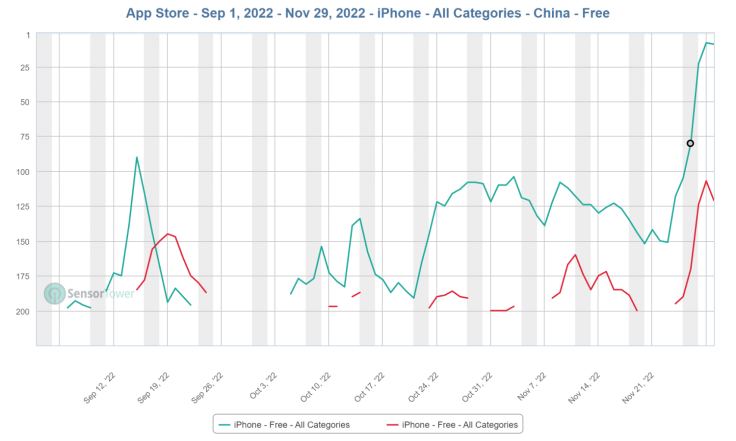Twitter and Telegram are becoming increasingly popular in China.
The Chinese people protesting the Chinese government's zero-COVID policy are increasingly turning to banned foreign apps to communicate with the outside world and coordinate further protests.
The Chinese government banned these apps to better monitor people's internet activity with government-approved local alternatives, which are heavily censored, per Nord VPN.
The Flourishing Of Banned Foreign Apps In China
The people of China are protesting their government's Zero COVID on the streets, and they are showing no signs of stopping as of press time. According to a report from Business Insider, they are increasingly using banned foreign apps such as Twitter and Telegram to get information past the Great Firewall and unto the outside world and communicate and organize protests across China, respectively.

App analytics firm SensorTower can confirm this rise in popularity for the two apps, with Twitter becoming the ninth most popular app in the Chinese Apple App Store while Telegram became its 121st.
Interestingly, these apps, like all other banned foreign apps, could only be accessed through a virtual private network (VPN) or a censorship circumvention tool in China. The fact these apps saw a popularity increase means that many in the country are braving the consequences to get the word out to the rest of the world and coordinating with other protesters to keep the protests going.
The protests happened following the deaths of at least ten people in a fire in a residential building in Urumqi, the capital of the Xinjiang Uyghur Autonomous Region, per the BBC.
The firefighters' trucks weren't able to get close to the residential building due to the uncharged EVs blocking the road to it, causing the water from their hoses to not reach the proper floor.
The people living in the affected areas are also unable to leave their residences because they are locked in them. China's zero-COVID policy prevents anyone from going out of their residences, even locking people in homes and buildings to prevent them from getting infected or spreading the virus.
Unfortunately, with Elon Musk's sacking of the team responsible for fighting propaganda and misinformation, bot accounts tweeting about adult content, escort ads, and gambling links are making searches for Chinese cities in the country difficult, per Tech Crunch.
Chinese Police And Random Stop-And-Search Checks
Mon 28 November 2022. Plainclothed police beating innocent protestor when he refuses to unlock his phone
— awetnappy (@awetnappy) November 28, 2022
"open your phone"
"why wont you open your phone"
"open your phone let me see"#china #beijing #shanghai @BBCWorld #bbc #reporter #covid #lockdown #protest #freedom #Fight pic.twitter.com/Ztp51UEil5
Additionally, the Chinese government seems to be aware of the popularity of Twitter and Telegram among the protestors. Police in Shanghai are conducting random stop-and-search checks in Shanghai and are looking for these banned apps in people's phones and other protest-related content from their phones.
A video tweeted by senior BBC journalist Edward Lawrence showed police officers forcing protestors to delete protest-related content from their phones. Meanwhile, refusal meant being on the receiving end of a beatdown from police, as evidenced by a video circulating on Twitter.
The Shanghai and Beijing police did not respond to any inquiries regarding the searches.









